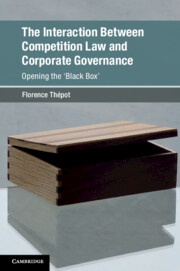Book contents
- The Interaction Between Competition Law and Corporate Governance
- Global Competition Law and Economics Policy
- The Interaction Between Competition Law and Corporate Governance
- Copyright page
- Contents
- Figures and Tables
- Preface and Acknowledgements
- Abbreviations
- Table of Cases
- Table of Legislation, Official Papers and Policy Documents
- 1 Introduction
- 2 Theoretical Foundations
- Part I The Conception of the Firm
- Part II Opening the ‘Black Box’: the Case of Cartels
- Bibliography
- Index
1 - Introduction
Published online by Cambridge University Press: 01 February 2019
- The Interaction Between Competition Law and Corporate Governance
- Global Competition Law and Economics Policy
- The Interaction Between Competition Law and Corporate Governance
- Copyright page
- Contents
- Figures and Tables
- Preface and Acknowledgements
- Abbreviations
- Table of Cases
- Table of Legislation, Official Papers and Policy Documents
- 1 Introduction
- 2 Theoretical Foundations
- Part I The Conception of the Firm
- Part II Opening the ‘Black Box’: the Case of Cartels
- Bibliography
- Index
Summary
- Type
- Chapter
- Information
- The Interaction Between Competition Law and Corporate GovernanceOpening the 'Black Box', pp. 1 - 17Publisher: Cambridge University PressPrint publication year: 2019



